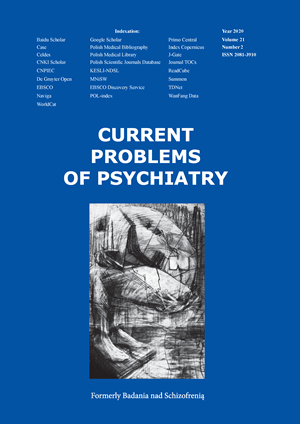Psychiatric, psychological and ethical determinants of the phenomenonof self-stigmatization of mental illness – literature review
DOI:
https://doi.org/10.2478/cpp-2020-0006Keywords:
stigmatization, elf-stigma, mental illness, schizophreniaAbstract
Introduction. In psychiatry and psychology stigmatization consists in labelling a person suffering from a disorder with the stigma of mental illness, associated with numerous negative stereotypes that are established in both individual and social mentality.
Objective. The aim of the present article is to present the phenomenon of self-stigma from the perspective of psychiatric patients, including patients suffering from schizophrenia, to scientific consideration.
The state of knowledge: The available data on this subject suggests that schizophrenia is particularly stigmatized, and the degree of stigmatization of patients with this diagnosis is worsening. Self-stigma plays a significant role in various areas of patients' lives, sometimes discouraging them to continue therapy. Psychiatric patients have to face not only the symptoms of their disorders, but also stigmatization. In the event patient's self-stigmatization of mental illness occurs, a responsible psychiatrist and psychologist conducting the therapy has the moral obligation to supervise the process of psychiatric and psychological assistance in the context of the aforelisted issues.
Conclusions. The problem of self-stigmatization of a psychiatric patients is a topical issue that is well worth further exploration in order to better understand and help patients more effectively.
References
1. Sartorius N. Wytyczne WPA: jak przeciwdziałać stygmatyzacji psychiatrii i psychiatrów, 2011.
2. Gałecki P, Pilecki MW, Rymaszewska J, Szulc A, Sidorowicz S, Wciórka J. Kryteria diagnostyczne zaburzeń psychicznych DSM-5®; Wrocław, Edra Urban & Partner: 2018.
3. Hajdukiewicz D. Zagadnienia psychiatrii sądowej. Część I Podstawy prawne i medyczne; Warszawa, Instytut Psychiatrii i Neurologii: 2016.
4. Wielka Encyklopedia Powszechna; Warszawa, PWN: 2000-2004.
5. Świtaj P. Doświadczanie piętna społecznego i dyskryminacji u pacjentów z rozpoznaniem schizofrenii, Warszawa, 2008.
6. Jackowska E. Stygmatyzacja i wykluczenie społeczne osób chorujących na schizofrenię – przegląd badań i mechanizmy psychologiczne. Psychiatria Polska 2009; XLIII (6): 655-670.
7. Vogel DL, Wade NG & Haake S. Measuring the self stigma associated with seeking psychological help. Journal of Counseling Psychology 2006; 53(3), 325.
8. Podogrodzka-Niell M, Tyszkowska M. Stygmatyzacja na drodze zdrowienia w chorobach psychicznych – czynniki związane z funkcjonowaniem społecznym. Psychiatria Polska 2014; 48(6), 1201-1211.
9. Evans-Lacko S, Brohan E, Mojtabai R, Thornicroft G. Association between public views of mental illness and self stigma among individuals with mental illness in 14 European countries. Psychological medicine 2012; 42 (08), 1741-1752.
10. Michaels PJ, López M, Rüsch N, Corrigan PW. Constructs and concepts comprising the stigma of mental illness. Psychology, Society, & Education 2017; 4(2), 183-194.
11. Schomerus G, Schwahn C, Holzinger A, Corrigan PW, Grabe H J, Carta MG et al. Evolution of public attitudes about mental illness: A systematic review and meta‐analysis. Acta Psychiatrica Scandinavica 2012; 125(6), 440-452.
12. Babicki M, Kotowicz K, Piotrowski P, Stramecki F, Kobyłko A, Rymaszewska J. Obszary stygmatyzacji i dyskryminacji osób chorujących psychicznie wśród respondentów internetowych w Polsce. Psychiatria Polska 2018; 52(1), 93-102.
13. Chotkowska K. Experienced and perceived stigma among people suffering from schizophrenia. Advances in Psychiatry and Neurology/Postępy Psychiatrii i Neurologii, 2018; 27(4), 304-317.
14. Treichler EB, Lucksted AA. The role of sense of belonging in selfstigma among people with serious mental illnesses. Psychiatric rehabilitation journal 2018; 41(2), 149.
15. Kamaradova D, Latalova K, Prasko J, Kubinek R, Vrbova K, Mainerova B. et al. Connection between self-stigma, adherence to treatment, and discontinuation of medication. Patient preference and adherence, 2016; 10, 1289.
16. Chotkowska K. Choroby psychiczne. Edukacja antydyskryminacyjna. Ogrody Nauk i Sztuk 2019; 9, 56-62.
17. Zadrożna, A. Wiedza płynąca z doświadczenia choroby psychicznej jako możliwość wejścia w inną rolę społeczną. Przykład funkcjonowania grup samopomocowych osób chorujących psychicznie na poziomie psychologicznym i społecznym. Ogrody Nauk i Sztuk 2019; 9, 162-169.
18. Morris E, Hippman C, Murray G, Michalak EE, Boyd JE, Livingston J. et al. Self-stigma in relatives of people with mental illness scale: development and validation. The British Journal of Psychiatry 2018; 212(3), 169-174.
19. Tucker JR, Hammer JH, Vogel DL, Bitman RL, Wade NG, Maier EJ. Disentangling self-stigma: Are mental illness and help-seeking self-stigmas different?. Journal of Counseling Psychology, 2013;60(4), 520.
20. Mak WW, Wu CF. Cognitive insight and in the development of self-stigma among individuals with schizophrenia. Psychiatric Services, 2006; 57(12), 1800-1802.
21. Karidi M V, Vassilopoulou D, Savvidou E, Vitoratou S, Maillis A, Rabavilas A. et al. Bipolar disorder and self-stigma: A comparison with schizophrenia. Journal of affective disorders, 2015; 184, 209-215.
22. Tyszkowska M, Podogrodzka M. Stygmatyzacja na drodze zdrowienia w chorobach psychicznych–czynniki bezpośrednio związane z leczeniem psychiatrycznym. Psychiatr. Pol, 2013;47(6), 1011-1022.
23. Jarema M. Stygmatyzacja w obronie przed stygmatyzacją; konferencja Człowiek i rodzina a zdrowie psychiczne, Katowice, 2016.
24. Bednarek D. Zawód psychologa. Regulacje prawne i etyka zawodowa; Warszawa, Wydawnictwo Naukowe PWN: 2016.
25. Czabała JC. Czynniki leczące w psychoterapii; Warszawa, Wydawnictwo Naukowe PWN: 2008.
26. Francis RD. Ethics for psychologists; John Wiley & Sons: 2010.
27. Fiutak A, Dąbrowski J. Udzielanie pomocy terapeutycznej. Aspekty prawne; Warszawa, Difin: 2012.
28. Stepulak MZ. Psycholog jako zawód zaufania społecznego; Lublin, Prace Wydziału Nauk Społecznych/Towarzystwo Naukowe Katolickiego Uniwersytetu Lubelskiego: 2007.
29. Bartnik CS. Personalizm; Lublin, Wydawnictwo „O.K.” Tomasz Wiater: 2000.
30. Góźdź K. Teologia człowieka; Lublin, Wydawnictwo KUL: 2006.
31. Popielski K. Noetyczny wymiar osobowości. Psychologiczna analiza poczucia sensu życia; Lublin, Redakcja Wydawnictw KUL: 1993.
32. Romanowska – Łakomy H. Psychologia doświadczeń duchowych; Warszawa, Wydawnictwo Psychologii i Kultury Eneteia: 1996.
33. Stepulak MZ. Tajemnica zawodowa psychologa; Lublin, RW KUL: 2014.
34. Szewczyk W. Kim jest człowiek? Zarys antropologii filozoficznej; Tarnów, Wydawnictwo Diecezji Tarnowskiej Biblos: 2009.
Downloads
Published
Issue
Section
License
Copyright (c) 2020 Authors

This work is licensed under a Creative Commons Attribution 4.0 International License.


